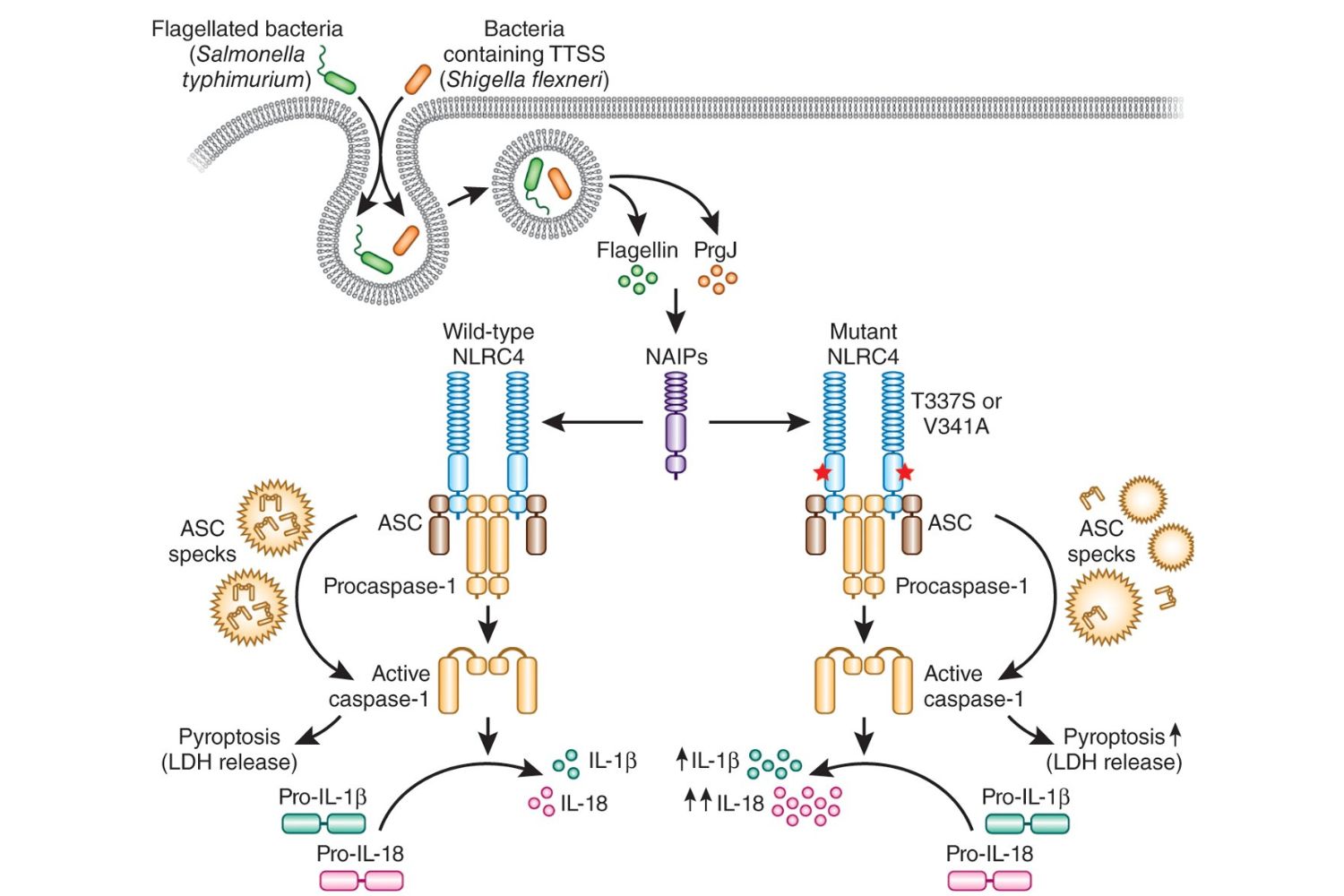
NLRC4 is a protein that plays a crucial role in the immune system. Found in humans, this protein helps detect harmful bacteria and triggers an immune response. But what makes NLRC4 so special? NLRC4 is part of a group known as NOD-like receptors, which are essential for recognizing pathogens. When activated, it forms a complex called the inflammasome, which then releases molecules to fight off infections. Understanding NLRC4 can provide insights into how our bodies defend against diseases. Ready to learn more? Here are 35 fascinating facts about NLRC4 that will deepen your appreciation for this tiny yet mighty protein.
Key Takeaways:
- NLRC4 is a crucial protein in our immune system, helping to fight bacterial infections by triggering inflammation. Mutations in NLRC4 can lead to serious autoinflammatory diseases, but researchers are working on potential therapies.
- Research on NLRC4 is ongoing and exciting, with potential implications for treating inflammatory diseases, understanding innate immunity, and even developing new drugs. Scientists are also exploring its role in neuroinflammation and metabolic diseases.
What is NLRC4?
NLRC4 is a protein that plays a crucial role in the immune system. It helps the body detect and respond to bacterial infections. Here are some fascinating facts about NLRC4:
- NLRC4 stands for NLR Family CARD Domain Containing 4.
- It is part of the NOD-like receptor (NLR) family, which is involved in immune responses.
- NLRC4 is also known as IPAF (ICE-protease activating factor).
- This protein is essential for the activation of inflammasomes, which are part of the body's defense mechanism.
- Inflammasomes are responsible for the production of pro-inflammatory cytokines like IL-1β and IL-18.
How Does NLRC4 Work?
Understanding how NLRC4 functions can shed light on its importance in the immune system. Here are some key points:
- NLRC4 detects bacterial flagellin and components of the bacterial type III secretion system.
- Upon detection, NLRC4 forms a complex with ASC (apoptosis-associated speck-like protein containing a CARD).
- This complex then recruits and activates caspase-1, an enzyme that processes pro-inflammatory cytokines.
- Activated caspase-1 cleaves pro-IL-1β and pro-IL-18 into their active forms.
- These cytokines are then released to initiate an inflammatory response.
Importance of NLRC4 in Health
NLRC4's role in the immune system makes it vital for maintaining health. Here are some facts about its significance:
- NLRC4 helps protect against bacterial infections by triggering inflammation.
- Mutations in the NLRC4 gene can lead to autoinflammatory diseases.
- These mutations can cause conditions like NLRC4-MAS (macrophage activation syndrome).
- NLRC4-MAS is characterized by excessive inflammation and can be life-threatening.
- Research is ongoing to develop therapies targeting NLRC4 for treating autoinflammatory diseases.
NLRC4 and Disease
NLRC4's involvement in disease extends beyond infections. Here are some intriguing connections:
- NLRC4 has been linked to inflammatory bowel disease (IBD).
- Studies suggest that NLRC4 may play a role in colitis, a type of IBD.
- NLRC4 deficiency can lead to increased susceptibility to Salmonella infections.
- Overactive NLRC4 can contribute to chronic inflammation.
- Researchers are exploring the potential of NLRC4 inhibitors for treating inflammatory diseases.
NLRC4 in Research
NLRC4 continues to be a focus of scientific research. Here are some exciting developments:
- Scientists are studying how NLRC4 interacts with other immune receptors.
- Research is being conducted to understand the structural biology of NLRC4.
- Animal models are used to study the effects of NLRC4 mutations.
- Researchers are investigating the role of NLRC4 in cancer.
- There is interest in developing therapeutics that modulate NLRC4 activity.
Fun Facts about NLRC4
Let's dive into some lighter, yet fascinating facts about NLRC4:
- NLRC4 was first identified in 2001.
- It is predominantly found in macrophages and dendritic cells.
- NLRC4 can form large protein complexes called inflammasomes.
- The study of NLRC4 has led to a better understanding of innate immunity.
- NLRC4 research has implications for vaccine development.
Future Directions for NLRC4 Research
The future holds many possibilities for NLRC4 research. Here are some areas of interest:
- Scientists are exploring the role of NLRC4 in neuroinflammation.
- There is ongoing research into how NLRC4 affects metabolic diseases.
- The development of NLRC4-specific drugs is a growing field.
- Researchers are studying the potential of gene therapy for NLRC4-related diseases.
- The role of NLRC4 in aging and longevity is an emerging area of study.
Final Thoughts on NLRC4
NLRC4 plays a crucial role in our immune system. It helps detect harmful bacteria, triggering an immune response. This protein is part of the inflammasome complex, which activates inflammatory responses. Mutations in the NLRC4 gene can lead to autoinflammatory diseases, causing excessive inflammation. Research on NLRC4 is ongoing, with scientists exploring its potential in treating various conditions. Understanding NLRC4 better could lead to new therapies for inflammatory diseases. This protein's importance in immune responses makes it a key focus for researchers. By studying NLRC4, we can learn more about how our bodies fight infections and manage inflammation. This knowledge could pave the way for innovative treatments, improving health outcomes for many. The future of NLRC4 research holds promise, offering hope for those affected by related diseases. Keep an eye on this fascinating field as it continues to evolve.
Frequently Asked Questions
Was this page helpful?
Our commitment to delivering trustworthy and engaging content is at the heart of what we do. Each fact on our site is contributed by real users like you, bringing a wealth of diverse insights and information. To ensure the highest standards of accuracy and reliability, our dedicated editors meticulously review each submission. This process guarantees that the facts we share are not only fascinating but also credible. Trust in our commitment to quality and authenticity as you explore and learn with us.
